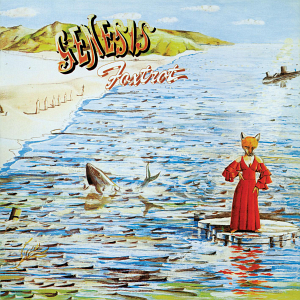I was at the Steve Hackett Genesis Revisited II concert in London on Friday, and what a fantastic show it was! Excellent to be transported back to all those Genesis songs I grew up with in the 70s and to see some wonderful guest artists, such as Nik Kershaw and John Wetton. I'm a massive Genesis fan and am not pleased to have been born too late to see them touring with the classic line-up of Banks, Gabriel, Collins, Hackett and Rutherford (so if anyone knows somebody with a TARDIS, let me know).
Steve has Nad Sylvan from Swedish band Unifaun taking on the lion's share of the vocal duties on this tour, and doing a very impressive job.
So why the blog post? My ears picked up one interesting weak vowel difference during the song "Supper's Ready" from the Foxtrot album. In the line "Today's the day to celebrate," Nad sang /ˈseləbreɪt/, whereas on various studio and live recordings Peter Gabriel and Phil Collins sing /ˈselɪbreɪt/. I'm such an anorak.
I wondered how much of this was owing to age differences - I say /ˈseləbreɪt/, for example, and I must be 15 or so years younger than Messrs Gabriel and Collins - or whether it was to do with Mr Sylvan being a non-native speaker of English. I've heard he lived in the US for a period of time, too, so I wondered if it was US pronunciation.
However, whereas the 14th edition of the EPD (1991) gives /ˈselɪbreɪt/ as the only pronunciation of this word, EPD18 (2011) gives /ˈseləbreɪt/ as the first variant for both UK and US English with /ˈselɪbreɪt/ as the second, as does John Wells' Longman Pronunciation Dictionary (LPD), with the Oxford Dictionary of Pronunciation giving their barred [ɪ] symbol in the second syllable to show it is one or the other.
I am deducing, then, with no knowledge of Mr Sylvan's age whatsoever, that this is largely an age difference.
However, it still sounds Australian to me to hear the -ed suffix pronounced with the /ə/ vowel instead of /ɪ/ - for example, started pronounced /ˈstɑːtəd/ rather than /ˈstɑːtɪd/ - although I acknowledge there seems to be a change in favour of /ə/ there, too.
When I was an undergraduate, I wanted to do my dissertation on the pronunciation of English in Abba songs. I was told this was "not academic enough" and ended up doing something on spelling. I'd be positively encouraging any undergraduate student who wanted to look at such things now ...
So why the blog post? My ears picked up one interesting weak vowel difference during the song "Supper's Ready" from the Foxtrot album. In the line "Today's the day to celebrate," Nad sang /ˈseləbreɪt/, whereas on various studio and live recordings Peter Gabriel and Phil Collins sing /ˈselɪbreɪt/. I'm such an anorak.
 |
| Genesis's Foxtrot album cover, courtesy of Wikipedia |
I wondered how much of this was owing to age differences - I say /ˈseləbreɪt/, for example, and I must be 15 or so years younger than Messrs Gabriel and Collins - or whether it was to do with Mr Sylvan being a non-native speaker of English. I've heard he lived in the US for a period of time, too, so I wondered if it was US pronunciation.
However, whereas the 14th edition of the EPD (1991) gives /ˈselɪbreɪt/ as the only pronunciation of this word, EPD18 (2011) gives /ˈseləbreɪt/ as the first variant for both UK and US English with /ˈselɪbreɪt/ as the second, as does John Wells' Longman Pronunciation Dictionary (LPD), with the Oxford Dictionary of Pronunciation giving their barred [ɪ] symbol in the second syllable to show it is one or the other.
I am deducing, then, with no knowledge of Mr Sylvan's age whatsoever, that this is largely an age difference.
However, it still sounds Australian to me to hear the -ed suffix pronounced with the /ə/ vowel instead of /ɪ/ - for example, started pronounced /ˈstɑːtəd/ rather than /ˈstɑːtɪd/ - although I acknowledge there seems to be a change in favour of /ə/ there, too.
When I was an undergraduate, I wanted to do my dissertation on the pronunciation of English in Abba songs. I was told this was "not academic enough" and ended up doing something on spelling. I'd be positively encouraging any undergraduate student who wanted to look at such things now ...